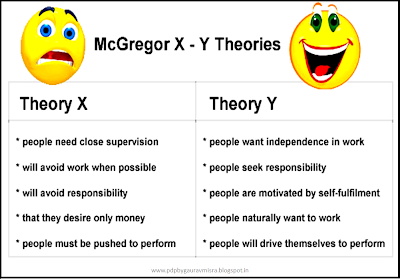MOTIVATION 1.5
[THEORIES of MOTIVATION]
a. Maslow's Need Hierarchy Theory
The basis of Maslow's theory of
motivation is that human beings are motivated by unsatisfied needs, and that
certain lower needs need to be satisfied before higher needs can be addressed. Physiological
Needs are those required to sustain life, such as Air, Water, Food, Sleep.
If these fundamental needs are not satisfied, then one will surely be motivated
to satisfy them. Higher needs such as social needs and esteem are not
recognized until one satisfies the needs basic to existence.
Once physiological needs are met, one's attention turns to Safety and Security in order to be free from the threat of physical and emotional harm. Such needs might be fulfilled by living in a safe area, medical insurance, job security, financial reserves. According to the Maslow hierarchy, if a person feels threatened, needs further up the pyramid will not receive attention until that need has been resolved.
Once a person has met the lower level physiological and safety needs, higher level motivators awaken. The first level of higher level needs are social needs. Social Needs are those related to interaction with others and may include friendship, belonging to a group, giving and receiving love.
After a person feels that they
"belong", the urge to attain a degree of importance emerges. Esteem
Needs can be categorized as external motivators and internal motivators.
Internally motivating esteem needs are those such as self-esteem, accomplishment, and self respect. External
esteem needs are those such as reputation and recognition. Some examples of
esteem needs are: Recognition, Attention, Social Status (external motivator)
and Accomplishment, Self-respect (internal motivator)
Self-actualization is the peak of Maslow's motivation theory. It is about the quest of reaching one's full potential as a person. Unlike lower level needs, this need is never fully satisfied; as one grows psychologically there are always new opportunities to continue to grow. Self-actualized people tend to have motivators such as truth, justice, wisdom, meaning. According to Maslow, only a small percentage of the population reaches the level of self-actualization.
b. McGregor X-Y Theory






No comments:
Post a Comment